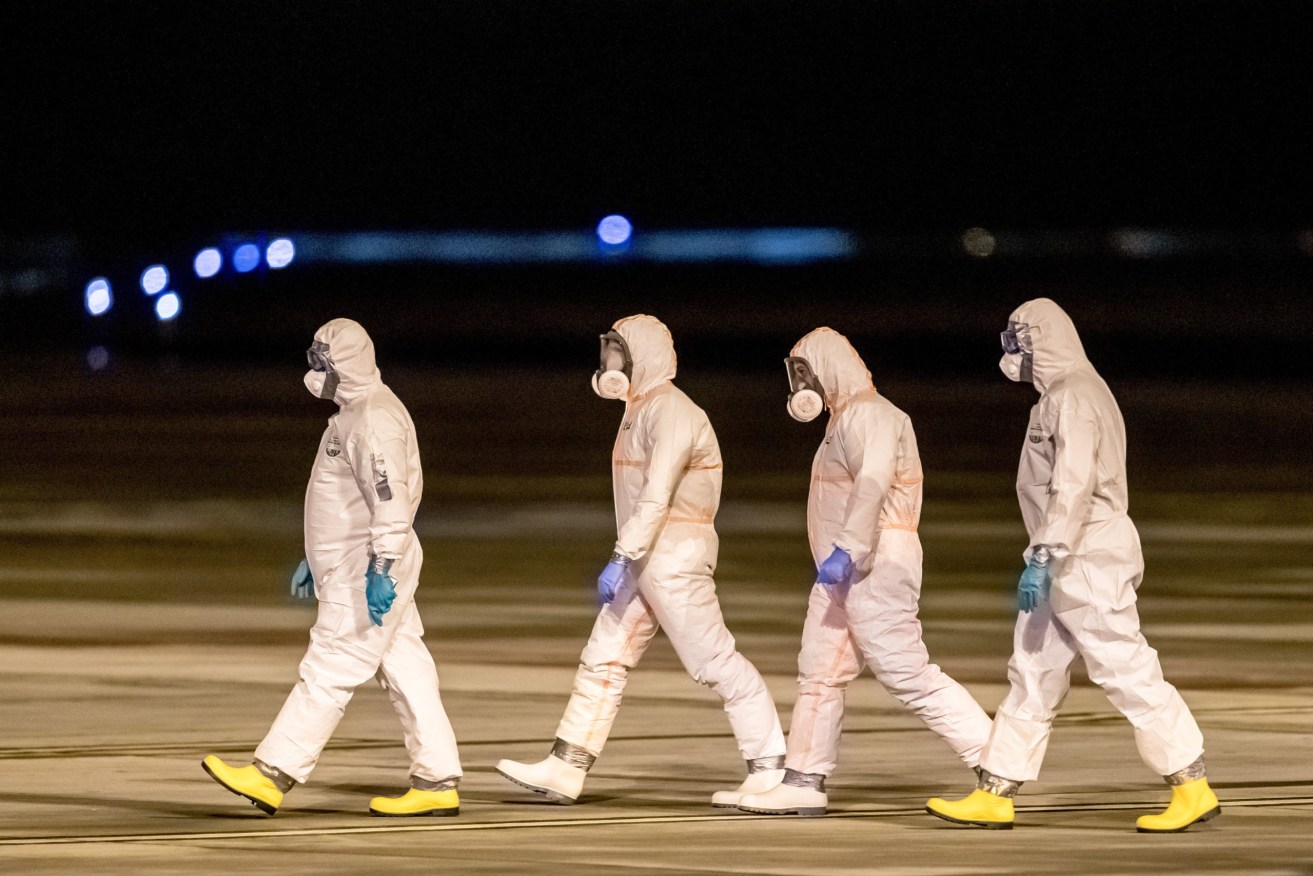Australians fly out of Wuhan virus zone
More than 200 Australians are heading home on a Qantas flight that has left the Chinese city Wuhan, the epicentre of the coronavirus outbreak.

Czech officials meet a plane returning nationals from Wuhan to Prague. Photo: EPA/Martin Divisek
China’s new coronavirus death toll is 361 and 2,829 new cases over the last 24 hours, bringing the Chinese total to 17,205.
The citizens and permanent residents were airlifted from the Hubei province capital just after 11am AEDT.
The plane is due to land at the RAAF Base Learmonth near Exmouth in Western Australia’s north about 2.30pm WST on Monday.
The passengers will later be taken to Christmas Island in smaller aircraft where they will be quarantined.
Earlier, Qantas CEO Alan Joyce paid tribute to the crew of four pilots and 14 cabin staff who volunteered for the mission.
“I spoke to the crew last night and through FaceTime video and they were all very keen to get this done and get the Aussies out,” he said.
The 244 passengers underwent health checks before boarding the flight and will wear surgical masks.
There will be a limited food and beverage service to minimise interaction between crew and passengers and the plane will undergo a three-day cleaning process when it returns.
The crew have masks, gloves, and sanitisers and will be placed on the upper deck of the aircraft.
“In-flight, there is water left on the seats. The crew go back to the upper deck, which is sealed.”
The plane has medical-grade filters that remove particles in the air, including viruses.
Foreign travellers who have left or passed through China will be denied entry to Australia to limit the spread of the virus.
Australian citizens, permanent residents and their immediate families, dependents, legal guardians and spouses, are exempt from the restrictions.
Some 71 travellers to Australia were not allowed to board their plane in China overnight and 12 flights were cancelled on Sunday.
Home Affairs Minister Peter Dutton said the government’s protective measures were effective.
“Many people now coming from mainland China, who have been in China as at the first of February, are deciding not to travel,” he told reporters in Canberra.
“That’s been because of the edict issued by the border force commissioner that people shouldn’t be uploaded onto flights.”
Tourism Minister Simon Birmingham said thousands of tourists would also be affected by the virus, with the sector expected to take an $11 billion hit, but public health must come first.
“This is our largest tourism market, our largest international education market, our largest trading partner so, of course, it is a significant and severe impact,” he told ABC radio.
Birmingham said Tourism Australia would look to “recalibrate” existing resources to help affected tourism operators, and urged Australians to holiday domestically.
Meanwhile, the US Department of Homeland Security is warning airline passengers that flights may wind up rerouted if officials discover mid-flight that someone onboard has been in China in the last 14 days.
That guidance was included in a notice released by the department Sunday as new travel restrictions officially go into effect.
Under the new rules, US citizens who have travelled in China within the last 14 days will be re-routed to one of eight designated airports, where they will undergo enhanced health screening procedures.
US citizens who have been in Hubei province where the outbreak originated will be subject to up to 14 days of mandatory quarantine.
US citizens who have been in other areas of China within the last 14 days will undergo “proactive entry health screening” and up to 14 days of “self-quarantine.”
Meanwhile, most non-US citizens who have travelled in China within the last 14 days will be denied entry into the United States, except for immediate family members of US citizens, permanent residents and flight crew.
“While the overall risk to the American public remains low, funnelling all flights with passengers who have recently been in China is the most important and prudent step we can take at this time to decrease the strain on public health officials screening incoming travellers,” said Chad Wolf, the acting DHS secretary.
“We realise this could provide added stress and prolong travel times for some individuals, however public health and security experts agree these measures are necessary to contain the virus and protect the American people,” Wolf said.
Asked in an interview aired Sunday on Fox how concerned he was over the outbreak, President Donald Trump said that “we pretty much shut it down coming in from China.”
“We’ve offered China help, but we can’t have thousands of people coming in who may have this problem, the coronavirus,” Trump said. “So we’re gonna see what happens, but we did shut it down, yes.”
-with AAP




